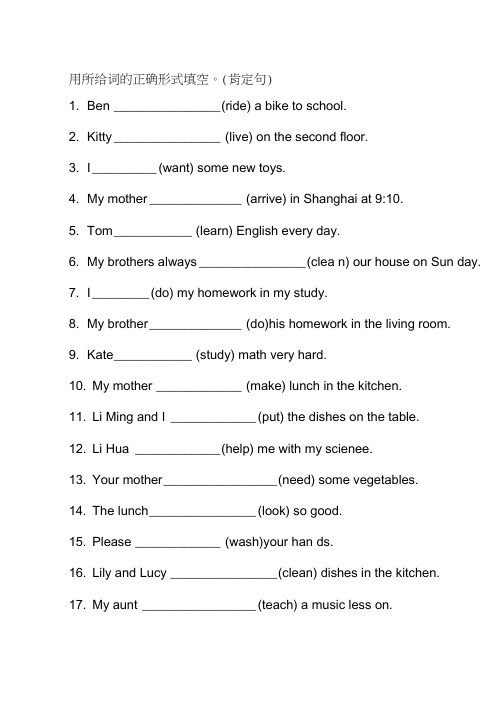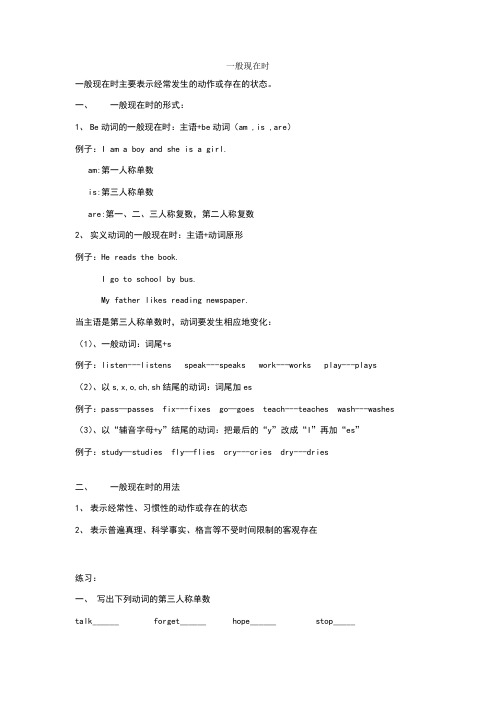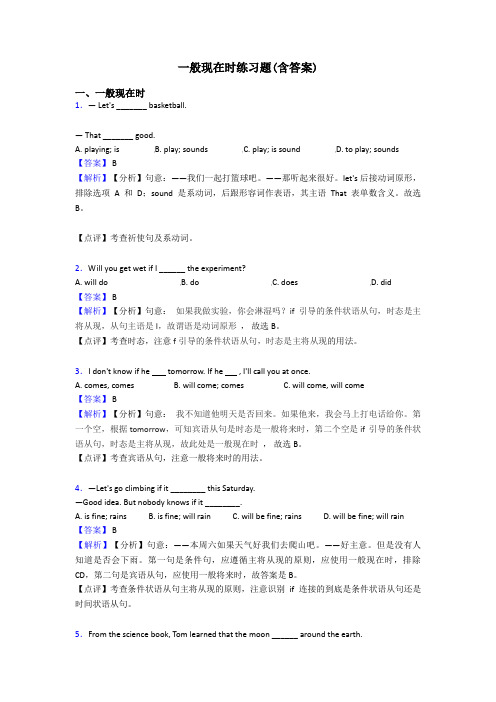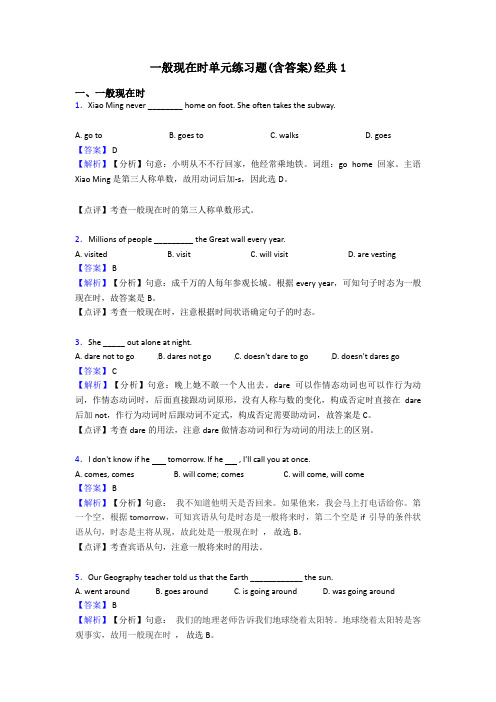实义动词的一般现在时练习
一般现在时(实义动词)--动词填空

用所给词的正确形式填空。
(肯定句)1. Ben _______________ (ride) a bike to school.2. Kitty _______________ (live) on the second floor.3. I _________ (want) some new toys.4. My mother _____________ (arrive) in Shanghai at 9:10.5. Tom ___________ (learn) English every day.6. My brothers always _______________ (clea n) our house on Sun day.7. I ________ (do) my homework in my study.8. My brother _____________ (do)his homework in the living room.9. Kate ___________ (study) math very hard.10. My mother ____________ (make) lunch in the kitchen.11. Li Ming and I ____________ (put) the dishes on the table.12. Li Hua ____________ (help) me with my scienee.13. Your mother ________________ (need) some vegetables.14. The lunch _______________ (look) so good.15. Please ____________ (wash)your han ds.16. Lily and Lucy _______________ (clean) dishes in the kitchen.17. My aunt ________________ (teach) a music less on.(否定句)1. He ____________________ (watch) TV after dinner.2. We ___________________ (wear) dresses in autumn.3. She _________ always ___________ (go) for a walk before breakfast.4. My son and daughter ____________ (like)_____________ to play cards.5. My grandmother ____________ (have) a brother.6. He ____________________ (read) English words every day.7. The children _________________________ (play) with the dishes.8. The man _______________________ (drive) a car to the library.9. The boy ____________________ (fly) a kite in the park.10. The girls ______________________ (draw) pictures at home.11. Jenny ___________ often ___________ (go) to school by bike.12. It __________ usually ___________ here jn autumn.13. We _______________________ (have) English lessons every day.14. Kim _______________________ (come) from the U.K.15. The old women ______________________ (sing) every morning.16. The little girl ___________________ (dance) every day.。
一般现在时

一般现在时讲解与练习一、一般现在时的功能1.表示事物或人物的特征、状态。
如:The sky is blue.天空是蓝色的。
2.表示经常性或习惯性的动作。
如:I get up at six every day.我天天六点起床。
3.表示客观现实。
如:The earth goes around the sun.地球绕着太阳转。
二、一般现在时的构成1. Be 动词的一般现在时结构:主语+be(am,is,are) +其它。
如:I am a boy.我是一个男孩。
2. 实义动词的一般现在时结构:①主语+实义动词原形+其它。
如:We study English.我们学习英语。
②主语(三单)+实义动词三单+其它。
如:He watches TV every day.附:动词第三人称单数的构成规则1)一般情况下加_______ 如:get----______ like--______2)以s, x, ch, sh, o结尾的加_____ 如: watch---________ go---_______ do---________3)以_________加y结尾的,改y为i,加es 如:carry---________ study---____________特殊:have---__________三、一般现在时的句型变化1. be动词的变化。
肯定句:主语+be(am,is,are) +其它。
如:I am a boy否定句:主语be+not +其它。
如:He is not a worker.一般疑问句:Be+主语+其它?如:-Are you a student? -Yes. I am. / No, I'm not.特殊疑问句:疑问词+一般疑问句?如:Where is my bike?2.实义动词的变化。
肯定句:①主语+实义动词原形+其它。
如:We study English.我们学习英语。
②主语(三单)+实义动词三单+其它。
一般现在时

一般现在时一般现在时主要表示经常发生的动作或存在的状态。
一、一般现在时的形式:1、Be动词的一般现在时:主语+be动词(am ,is ,are)例子:I am a boy and she is a girl.am:第一人称单数is:第三人称单数are:第一、二、三人称复数,第二人称复数2、实义动词的一般现在时:主语+动词原形例子:He reads the book.I go to school by bus.My father likes reading newspaper.当主语是第三人称单数时,动词要发生相应地变化:(1)、一般动词:词尾+s例子:listen---listens speak---speaks work---works play---plays (2)、以s,x,o,ch,sh结尾的动词:词尾加es例子:pass—passes fix---fixes go—goes teach---teaches wash---washes (3)、以“辅音字母+y”结尾的动词:把最后的“y”改成“I”再加“es”例子:study—studies fly—flies cry---cries dry---dries二、一般现在时的用法1、表示经常性、习惯性的动作或存在的状态2、表示普遍真理、科学事实、格言等不受时间限制的客观存在练习:一、写出下列动词的第三人称单数talk______ forget______ hope______ stop_____perform______ play______ say______ buy______ worry______ fly______ study_______ like_______ make______ take______love_______ recite_______ become_______ come_______ drive_______ shine_______leave_____ wake_______ ride_______ write_______ hike______give______ see______ swim______ stop______ shop_______ plan______ get______ sit_______ let_______ cut_______run_______ forget_______ begin_______ wash_____ watch_______ finish______ teach_____ fish_______ reach_______ go_______ do_____二、用括号内动词的适当形式填空。
一般现在时练习题(含答案)

一般现在时练习题(含答案)一、一般现在时1.— Let's _______ basketball.— That _______ good.A. playing; isB. play; soundsC. play; is soundD. to play; sounds【答案】 B【解析】【分析】句意:——我们一起打篮球吧。
——那听起来很好。
let's后接动词原形,排除选项A和D;sound是系动词,后跟形容词作表语,其主语That表单数含义。
故选B。
【点评】考查祈使句及系动词。
2.Will you get wet if I ______ the experiment?A. will doB. doC. doesD. did【答案】 B【解析】【分析】句意:如果我做实验,你会淋湿吗?if引导的条件状语从句,时态是主将从现,从句主语是 I,故谓语是动词原形,故选B。
【点评】考查时态,注意f引导的条件状语从句,时态是主将从现的用法。
3.I don't know if he tomorrow. If he , I'll call you at once.A. comes, comesB. will come; comesC. will come, will come【答案】 B【解析】【分析】句意:我不知道他明天是否回来。
如果他来,我会马上打电话给你。
第一个空,根据tomorrow,可知宾语从句是时态是一般将来时,第二个空是if 引导的条件状语从句,时态是主将从现,故此处是一般现在时,故选B。
【点评】考查宾语从句,注意一般将来时的用法。
4.—Let's go climbing if it ________ this Saturday.—Good idea. But nobody knows if it ________.A. is fine; rainsB. is fine; will rainC. will be fine; rainsD. will be fine; will rain 【答案】 B【解析】【分析】句意:——本周六如果天气好我们去爬山吧。
一般现在时单元练习题(含答案)经典1

一般现在时单元练习题(含答案)经典1一、一般现在时1.Xiao Ming never ________ home on foot. She often takes the subway.A. go toB. goes toC. walksD. goes【答案】 D【解析】【分析】句意:小明从不不行回家,他经常乘地铁。
词组:go home回家。
主语Xiao Ming 是第三人称单数,故用动词后加-s,因此选D。
【点评】考查一般现在时的第三人称单数形式。
2.Millions of people _________ the Great wall every year.A. visitedB. visitC. will visitD. are vesting【答案】 B【解析】【分析】句意:成千万的人每年参观长城。
根据every year,可知句子时态为一般现在时,故答案是B。
【点评】考查一般现在时,注意根据时间状语确定句子的时态。
3.She _____ out alone at night.A. dare not to goB. dares not goC. doesn't dare to goD. doesn't dares go【答案】 C【解析】【分析】句意:晚上她不敢一个人出去。
dare可以作情态动词也可以作行为动词,作情态动词时,后面直接跟动词原形,没有人称与数的变化,构成否定时直接在dare 后加not,作行为动词时后跟动词不定式,构成否定需要助动词,故答案是C。
【点评】考查dare的用法,注意dare做情态动词和行为动词的用法上的区别。
4.I don't know if he tomorrow. If he , I'll call you at once.A. comes, comesB. will come; comesC. will come, will come【答案】 B【解析】【分析】句意:我不知道他明天是否回来。
(完整版)一般现在时练习题及答案

14.I think the boy ________ (look) like his father. 【答案】looks 【解析】 【详解】 句意:我觉得这个男孩看起来像他的父亲。根据语境可知,该句为一般现在时,主语“the boy”是第三人称单数,谓语用动词的第三人称单数形式,“look”的第三人称单数形式是 “looks”。故填 looks。
2.Many kids ________ (在……有困难) getting along with their parents nowadays. 【答案】have trouble##have problems##have difficulty 【解析】 【详解】 句意:现在很多孩子与父母相处有困难。“在……有困难”为 have trouble/problems/difficulty doing sth.。本句为一般现在时,主语 many kid 是复数,动词 have 使用原形。故填 have trouble/problems/difficulty。
24.Sam often ________ (fly) kites with his friends on windy days. 【答案】flies 【解析】 【详解】 句意:萨姆经常在刮风的日子和他的朋友放风筝。根据“often”可知,该句为一般现在时, 主语“Sam”是第三人称单数,谓语用动词的三单形式,“fly”的三单形式是“flies”。故填 flies。
一般现在时-实意动词 练习

Lesson8一般现在时(含实义动词)every day◆一、填空。
1.第三人称单数主语,简称“”。
口诀:2.一般现在时肯定句中,遇到三单主语,后面的动词3.助动词do/does/don’t/doesn’t+实义动词的4.动词三单形式的变化规则并举例:含实义动词,主语是三单形式的句型转换:1.肯定句结构:例句:2.否定句结构:例句:3.一般疑问句结构:例句:口诀:1.肯变否:2.肯变疑:3.回答:二、写出下列动词的第三人称单数。
drink________go_______fly________run________ make________pass_______carry________brush________ come________study_______watch______catch________ do_________teach_______sit________stay________ have_______plant_______play________pick________ cry_______take_______tie_______like_______ ride_______paint_______speak_______live_______三、圈出正确的答案。
1.She(like/likes)to play football.2.He(like/likes)drinking milk.3.I(like/likes)to watch TV.4.We(like/likes)to play badminton.5.They(like/likes)to sing songs.6.She(read/reads)books every day.7.He(play/plays)computer games every day.8.It(listen/listens)to the radio every day.9.Linda(draw/draws)pictures every day.10.Jane and Linda(play/plays)football every day.四、肯定句填空。
实义动词的一般现在时练习(汇编)

实义动词的一般现在时练习一、句型转换1.She often does her homework after supper .(改为一般疑问句)______ she often _____ her homework after supper ?2. We have three meals a day . .(改为一般疑问句)_____ you _____three meals a day ?3. Jack studies English very hard .(改为否定句)Jack ______ ______ English very hard .4. They have lunch at school every day .(改为否定句)They _____ ______ lunch at school every day .(就画线部分提问)_____ _____ you ____ at school every day ?5.Do you often play football after school?(肯定回答)6.I have many books.(改为否定句)7.Gao Shan’s sister likes playing table tennis .(改为否定句)8.She lives in a small town near New York.(改为一般疑问句)9. I watch TV every day. (改为一般疑问句)10. David has got a goal. (改为一般疑问句)11. We have four lessons.(否定句)12. Nancy doesn’t run fast (肯定句)13. My dog runs fast. 否定/一般疑问句:14.Mike has two letters for him. 一般疑问句/否定句:15.I usually play football on Friday afternoon.否定句二、用适当的形式填空:1.I __(play)soccer every day.2.He often___(watch) TV at home.3.Tom__(have) breakfast at home.4.My teacher usually __(go)home late.5.He__(get) up at 6 o'clock.6.I__(have) many books.7.She __(have) two birds.8.Linda __(want) to go to Beijing.9.Ben usually__(study) English on Sunday.改句子。
- 1、下载文档前请自行甄别文档内容的完整性,平台不提供额外的编辑、内容补充、找答案等附加服务。
- 2、"仅部分预览"的文档,不可在线预览部分如存在完整性等问题,可反馈申请退款(可完整预览的文档不适用该条件!)。
- 3、如文档侵犯您的权益,请联系客服反馈,我们会尽快为您处理(人工客服工作时间:9:00-18:30)。
实义动词的一般现在时练习
一、句型转换
1.She often does her homework after supper .(改为一般疑问句)
______ she often _____ her homework after supper ?
2. We have three meals a day . .(改为一般疑问句)
_____ you _____three meals a day ?
3. Jack studies English very hard .(改为否定句)
Jack ______ ______ English very hard .
4. They have lunch at school every day .
(改为否定句)They _____ ______ lunch at school every day .
(就画线部分提问)_____ _____ you ____ at school every day ?
5.Do you often play football after school?(肯定回答)
6.I have many books.(改为否定句)
7.Gao Shan’s sister likes playing table tennis .(改为否定句)
8.She lives in a small town near New York.(改为一般疑问句)
9. I watch TV every day. (改为一般疑问句)
10. David has got a goal. (改为一般疑问句)
11. We have four lessons.(否定句)
12. Nancy doesn’t run fast (肯定句)
13. My dog runs fast. 否定/一般疑问句:
14.Mike has two letters for him. 一般疑问句/否定句:
15.I usually play football on Friday afternoon.否定句
二、用适当的形式填空:
1.I __(play)soccer every day.
2.He often___(watch) TV at home.
3.Tom__(have) breakfast at home.
4.My teacher usually __(go)home late.
5.He__(get) up at 6 o'clock.
6.I__(have) many books.
7.She __(have) two birds.
8.Linda __(want) to go to Beijing.
9.Ben usually__(study) English on Sunday.
改句子。
